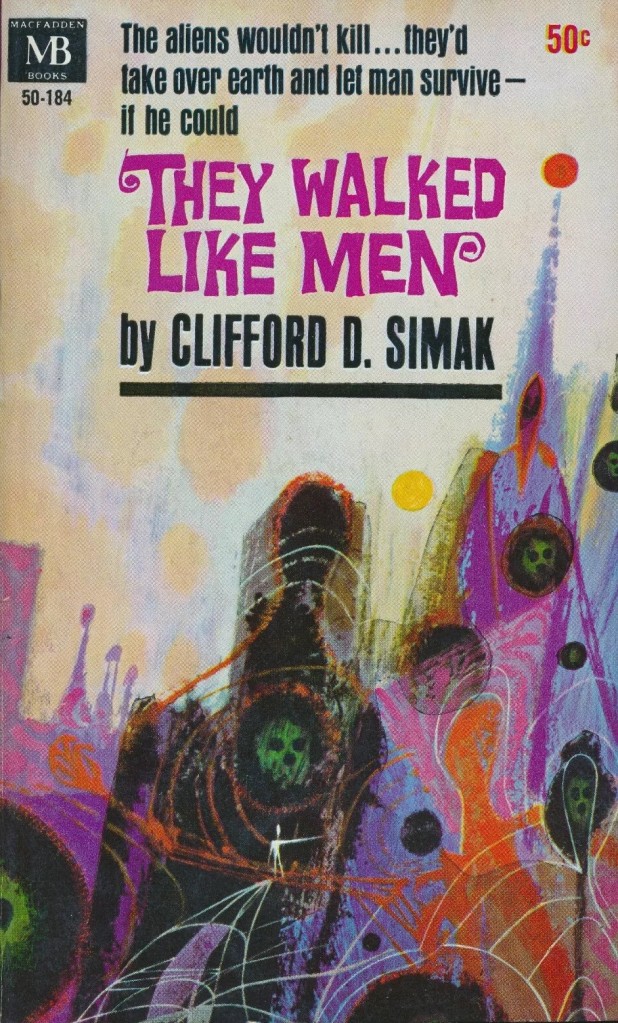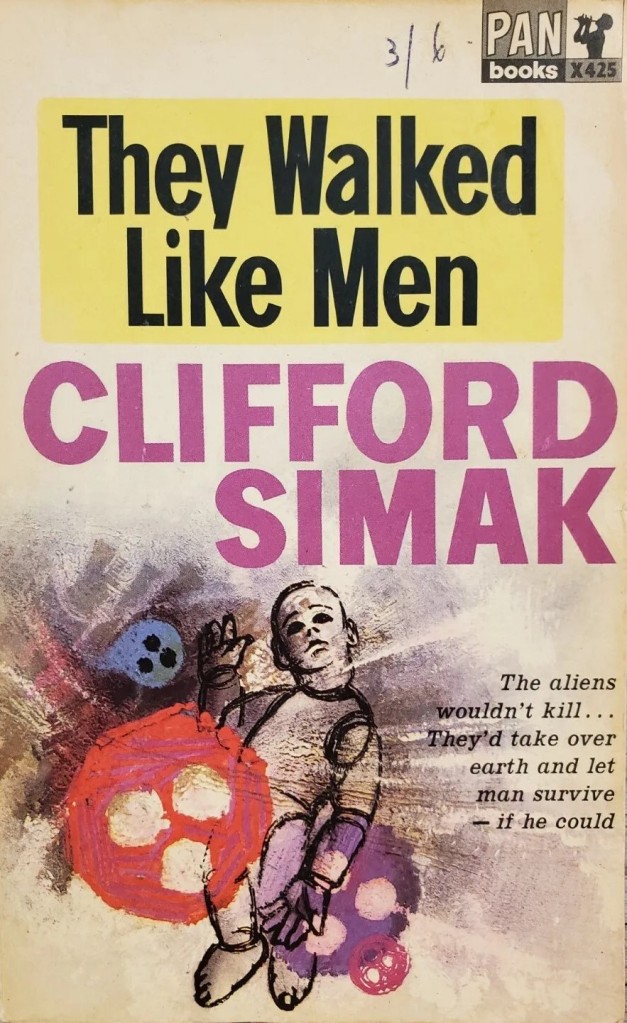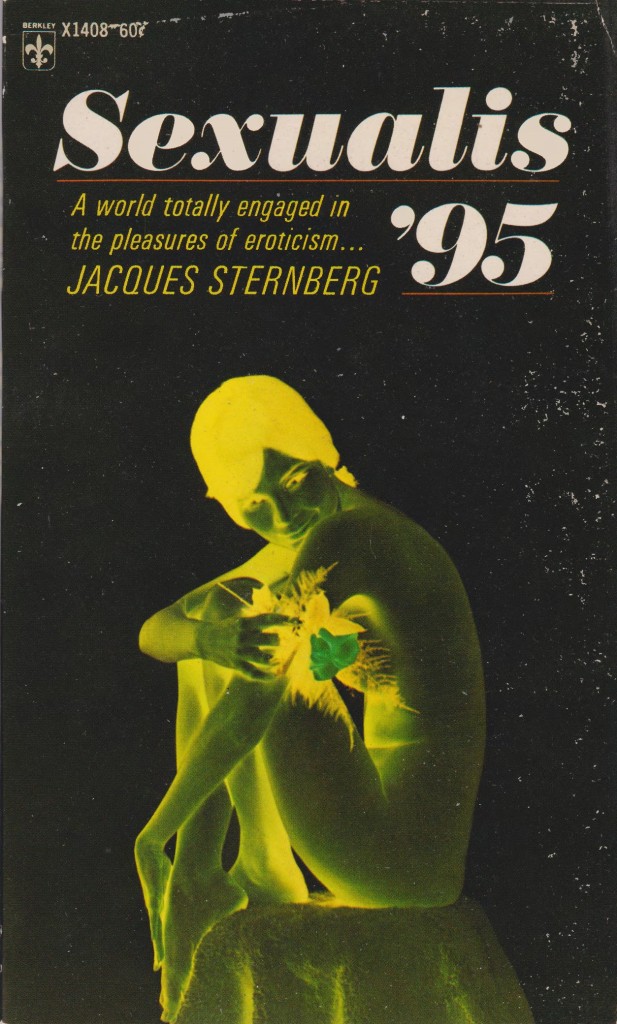Note: My read but “waiting to be reviewed pile” is growing. Short rumination/tangents are a way to get through the stack before my memory and will fades. My website partially serves as a record of what I have read and a memory apparatus for future projects. Stay tuned for more detailed and analytical reviews.
1. They Walked Like Men, Clifford D. Simak (1962)

Richard Powers’ cover for the 1963 edition
3/5 (Average)
In a confrontation with maleficent alien land prospectors in Clifford D. Simak’s They Walked Like Men (1962), the main character ruminates that “it was almost if [we] were acting out an old morality play, with the basic sins of mankind enlarged a millionfold to prove a point by exaggeration” (113). Simak’s moment of meta-commentary on his own narrative and tonal choices gives shape to odd conjuration of juvenile comedy and apocalyptic extrapolation of capitalism unleased.
Evil metamorphic aliens, often shaped like bowling balls, arrive on Earth and proceed to secretively purchase everything possible via mysterious shell companies: “We Deal in Everything” (57). Newspaperman Parker Graves. a typical Simak hero (they share a profession), with the assistance of his spunky and smart girlfriend (and fellow newspaperperson) Joy Kane uncover the entirely legal conspiracy. Albeit, the aliens achieved their aim through shapeshifting and a lot of weirdly realistic dolls. The purpose? Turn Earth into a playground and resort! Earth is a rare “dirt-type planet” in which aliens could “rest their aching bones and solace their aching eyes” (83). As Parker Graves speculates wildly on a future in which humanity is dispossessed of its property unable to convince anyone but Joy of the plot, he accidentally uncovers the cure for the alien infestation.
Simak’s best moments involve Graves’ ruminations on American business ethic and how society is inexplicably entwined with profit-making. In one moment, he reflects on the role of the supermarket in town–“For Franklin’s was not a shopping center only; it was likewise an unofficial social center” (28). Other highlights include Graves apocalyptic extrapolations of what is to come. He imagines roving bands of nomads trying to survive under the shadow of alien tourists (126). Unfortunately, the extrapolated world is far more interesting than what actually happens in the story. There’s a deep irony to the proceedings as Simak had lived through the Great Depression, and unregulated business and rampant greed were important causes. The ridiculous aliens serve to exaggerate humanity’s flaws. Is the acquisition of wealth really a virtue? And of course, at the novel’s most serious moment, a phone call between Graves and a senator in which he advocates banning private property as the aliens seem bent on following Earth laws, the story takes a radical left turn down the most hilarious path possible.
Far from top-tier Simak, I can only recommend They Walked Like Men (1962) for Simak completists (not me) or fanatical gatherers of evidence for particular historical questions (me). It’s an interesting one. I mean, Simak directly makes the soulless alien capitalists look like gigantic human testicles: “The sack [with aliens] hung there, suspended in midair. The plastic was so transparent that you could see the bowling balls without any trouble, every line and shade of them.” Balls.
And with image I shall leave you!

Uncredited cover for the 1965 UK edition
2. Toi, ma nuit (translated title: Sexualis ’95), Jacques Sternberg (1965, trans. by Lowell Blair, 1967)

Uncredited cover for the 1967 edition
2.75/5 (Vaguely Average)
Jacques Sternberg (1923-2006) was a Belgian author associated with the surrealists who occasionally published SF, especially early in his career. He dabbled in film as well. He wrote the script for Alain Resnais’ fascinating French New Wave SF film Je T’aime, Je T’aime (1968). Back in 2019, I read and mostly enjoyed Jacques Sternberg’s collection Future Without Future (1971, trans. 1973) and decided to track down his only SF novel available in English translation, Toi, ma nuit (translated title: Sexualis ’95) (1965, trans. 1967). I struggled with this one! I lack the historical knowledge to completely understand his satirical purpose. I apologize in advance for my half-hearted attempt to put down my thoughts.
Sternberg posits a near-future chronology of collapse and rebirth. From 1950 to 1972, a society revolving around consumerism thrived in which men live only for their “ambition to make a future for themselves, to have a healthy bank account” and to fill their homes with things (40). The psychological impact of this relentless drive comes crashing down in 1975. And in this “neurotic climate” a (nuclear?) war breaks out in which 30 million people die (41). A book is published that promises all the answers–Sex is our Sword, by von Kieffer (41). He argues that man has gained nothing from his pursuit of things. Everything can be solved with sex! And his theory catches on.
Sex in art and culture becomes a dominate monotony: “has now expanded until there’s no room for anything else. It envelops nearly every thought of the human race” (21). Want to sell Chocolate Yummies? Have a shapely girl unwrap herself as if she were a candy (21). Want to watch a film? Choose between Sade, You’re a Prude! and The Rape of Frankenstein (15). Oh, and you can have sex with the hostesses as well. Our narrator, an ad man who gives little thought to his job but always comes up with the best (sex-filled) slogans, feels like a man adrift. He surrounds himself with the relics of the pre-war past. One day at work, he encounters a woman who seems to be applying for a job. Her demeanor and mannerisms seem off: “her whole face seemed to affirm that she had never had anything to say to anyone, and she had no message to transmit” (55). He’s transfixed. He speculates that he “might be the only man on earth who was attached to one woman” (63). But who is she? What does she want with him? Is something wrong with her? She seems separate from the sex-drenched world around them.
Sternberg incorporates some interesting observations about the intersection of art and anxiety. Our narrator observes that he enjoyed music, books and art from before the War of 1975 and the stabilization that occurred: “Prewar anxiety was of better quality, richer in resonances and repercussions. There was something awesome and poignant about it” (14). He characterizes contemporary anxiety, held in spades, takes the form of an “inarticulate howl that has neither charm nor precise meaning” (14). Unfortunately, Sexualis ’95 (and my review) reads a bit like an inarticulate howl. The targets of the misanthropic diatribes–advertising, sex, art, music, film, architectural, MODERN CULTURE–shift wildly and without precision. It’s a deliberate, almost encyclopedic, inundation. It’s all a bit shapeless. A manifesto without the art.
As I mentioned in my earlier review, Sternberg’s bleak outlook on humanity’s increasing inability to connect with each other and our pasts conjures the nihilistic black comedies of Barry N. Malzberg. Malzberg, on the other hand, can focus his narratives. He sharpens his hooks. If you’re interested in exploring Sternberg’s work, check out “Fin de siècle” (1971) in Future Without Future first.
For book reviews consult the INDEX
For cover art posts consult the INDEX
For TV and film reviews consult the INDEX
I read Simak’s THEY WALK LIKE MEN twenty-something years ago, it was great to be reminded of such a ridiculous effort. A similar take on this theme by Simak (much less silly) can be found in THE VISITORS (1981).
Ah, I know little about The Visitors (1981). But yes, definitely evidence that a few central concerns dominated his thought. I have Ring Around the Sun (1953) on my list as I’m focusing on his 40s-60s stuff at the moment. It’s supposed to be better!
I reread RING AROUND THE SUN a few years ago. It’s sort of like Jack Finney and A.E. van Vogt run through an eggbeater. Lumpy! It’s separating already! But the critique of capitalism does put in an appearance.
I well remember reading THEY WALKED LIKE MEN when it came out (it was an SF Book Club selection) and finding it silly. It gave me a new respect for his immediately preceding novel THE FISHERMAN a/k/a TIME IS THE SIMPLEST THING. I believe THEY WALKED LIKE MEN was Simak’s first novel after he quit his day job.
Hello John,
Simak never quit his day job. He was a fulltime newspaper reporter until his retirement — at the age of 72 — in 1976. Shakespeare’s Planet was the first of his novels to appear after his retirement.
The only reason I am reading Ring Around the Sun is its critique of capitalism! I am also hoping it’s slightly better than They Walked Like Men — hah.
Thanks for the correction. I remember, apparently incorrectly, seeing on an old book jacket that Simak would be becomng a full-time writer in the early ’60s. Fake news, it seems.
It’s quite incredible that he wrote so much and had a full-time job!
Long ago, in the pages of the Skeptical Inquirer, I came across an account (perhaps second hand through Poul Anderson) of the only story Simak had censored in his reporter days.
He was less than accepting of the notion that the Kensington Runestone, alleged evidence of Vikings making it to Alexandria, MN, was real.
I wonder if that is mentioned in Muriel R. Becker’s extensive primary and secondary bibliography — which includes his newspaper work and all other non-fiction — on him: https://archive.org/details/clifforddsimakpr0000beck/mode/2up
I always mentally re-title They Walk Like Men to They Rolled Like Bowling Balls.
I agree that it and The Visitors have always been linked in my mind as evidence of Simak’s concern with matters economic.
Yeah, it’s not good. My “average” rating might have been too kind. Hah.
I’ll keep The Visitors in mind. As I have been reading far more on 50s history of the labor movement, social criticism, etc. I was eager to keep my net narrow (40s/50s maybe a word on a 60s novel like They Walked Like Men).
I looked up RING AROUND THE SUN and it does sound promising. My longstanding goal is to read THE WEREWOLF PRINCIPLE (1967), after thirty-five years of reading Simak I may finally find the time.
I read and reviewed The Werewolf Principle (1967). I liked it more than They Walked Like Men. I still don’t think it’s top-tier Simak.
I can’t remember if I asked or not but have you read Why Call Them Back From Heaven? It’s secretly one of his best works in my view… for the world and issues of morality that it raises. The narrative itself, like so many of Simak’s works, relies too much on a boring cop-out.
I do have a copy of WHY CALL THEM BACK TO HEAVEN?, also on my to read list. Even though I’ve read a lot of Simak’s work I have to agree with you. The crazy details I like in his work don’t always work together to form a cohesive whole.
I’d argue that Why Call Them Back from Heaven? has the single best Simak idea — how would society change if everyone believed that immortality could be possible in the near future. As for the actual thriller narrative within the world, the details completely escape me…